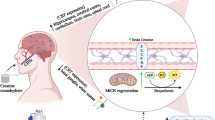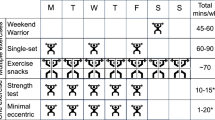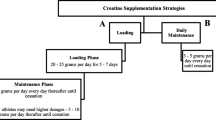Abstract
Purpose
It is usually stated that glycogen is stored in human muscle bound to water in a proportion of 1:3 g. We investigated this proportion in biopsy samples during recovery from prolonged exercise.
Methods
On two occasions, nine aerobically trained subjects (\(\dot{V}{\text{O}}_{2\hbox{max} }\) = 54.4 ± 1.05 mL kg−1 min−1; mean ± SD) dehydrated 4.6 ± 0.2 % by cycling 150 min at 65 % \(\dot{V}{\text{O}}_{2\hbox{max} }\) in a hot-dry environment (33 ± 4 °C). One hour after exercise subjects ingested 250 g of carbohydrates in 400 mL of water (REHLOW) or the same syrup plus water to match fluid losses (i.e., 3170 ± 190 mL; REHFULL). Muscle biopsies were obtained before, 1 and 4 h after exercise.
Results
In both trials muscle water decreased from pre-exercise similarly by 13 ± 6 % and muscle glycogen by 44 ± 10 % (P < 0.05). After recovery, glycogen levels were similar in both trials (79 ± 15 and 87 ± 18 g kg−1 dry muscle; P = 0.20) while muscle water content was higher in REHFULL than in REHLOW (3814 ± 222 vs. 3459 ± 324 g kg−1 dm, respectively; P < 0.05; ES = 1.06). Despite the insufficient water provided during REHLOW, per each gram of glycogen, 3 g of water was stored in muscle (recovery ratio 1:3) while during REHFULL this ratio was higher (1:17).
Conclusions
Our findings agree with the long held notion that each gram of glycogen is stored in human muscle with at least 3 g of water. Higher ratios are possible (e.g., during REHFULL) likely due to water storage not bound to glycogen.



Similar content being viewed by others

Abbreviations
- \(\dot{V}{\text{O}}_{2\hbox{max} }\) :
-
Maximal oxygen consumption
- h:
-
Hours
- yrs:
-
Years
- Usg:
-
Urine specific gravity
References
Arts FJ, Kuipers H, Jeukendrup AE, Saris WH (1993) A short cycle ergometer test to predict maximal workload and maximal oxygen uptake. Int J Sports Med 14:460–464
Bergström J, Hermansen L, Hultman E, Saltin B (1967) Diet, muscle glycogen and physical performance. Acta Physiol Scand 71:140–150
Bridge EM, Bridges EM (1931) The relation of glycogen to water storage in the liver. J Biol Chem 96:381–386
Brooks G, Fahey T (1984) Exercise Physiology. Macmillan Publishing Co, New York
Coggan AR, Swanson SC (1992) Nutritional manipulations before and during endurance exercise: effects on performance. Med Sci Sports Exerc 24:S331–S335
Cohen J (1988) Statistical Power Analysis for the Behavioral Sciences. Lawrence Erlbaum, New Jersey
Costill DL, Pearson DR, Fink WJ (1988) Impaired muscle glycogen storage after muscle biopsy. J Appl Physiol 64:2245–2248
Febbraio MA, Snow RJ, Stathis CG, Hargreaves M, Carey MF (1994) Effect of heat stress on muscle energy metabolism during exercise. J Appl Physiol 77:2827–2831
Fernandez-Elias VE, Hamouti N, Ortega JF, Mora-Rodriguez R (2014a) Hyperthermia but not muscle water deficit increases glycogen use during intense exercise. Scand J Med Sci Sports (in press)
Fernandez-Elias VE, Martinez-Abellan A, Lopez-Gullon JM, Moran-Navarro R, Pallares JG, De la Cruz-Sanchez E, Mora-Rodriguez R (2014b) Validity of hydration non-invasive indices during the weightcutting and official weigh-in for Olympic combat sports. PLoS One 9:e95336
Geddes R, Harvey JD, Wills PR (1977) The molecular size and shape of liver glycogen. Biochem J 163:201–209
Howarth KR, Moreau NA, Phillips SM, Gibala MJ (2009) Coingestion of protein with carbohydrate during recovery from endurance exercise stimulates skeletal muscle protein synthesis in humans. J Appl Physiol 106:1394–1402
Ivy JL, Katz AL, Cutler CL, Sherman WM, Coyle EF (1988a) Muscle glycogen synthesis after exercise: effect of time of carbohydrate ingestion. J Appl Physiol 64:1480–1485
Ivy JL, Lee MC, Brozinick JT Jr, Reed MJ (1988b) Muscle glycogen storage after different amounts of carbohydrate ingestion. J Appl Physiol 65:2018–2023
Krauchi K, Wirz-Justice A (1994) Circadian rhythm of heat production, heart rate, and skin and core temperature under unmasking conditions in men. Am J Physiol 267:R819–R829
Kreitzman SN, Coxon AY, Szaz KF (1992) Glycogen storage: illusions of easy weight loss, excessive weight regain, and distortions in estimates of body composition. Am J Clin Nutr 56:292S–293S
Low SY, Rennie MJ, Taylor PM (1996) Modulation of glycogen synthesis in rat skeletal muscle by changes in cell volume. The Journal of physiology 495(Pt 2):299–303
MacKay EM, Bergman MC (1932) The relation between glycogen and water storage in the liver. J Biol Chem 96:373–380
Mora-Rodriguez R, Fernandez-Elias VE, Hamouti N, Ortega JF (2014) Skeletal muscle water and electrolytes following prolonged dehydrating exercise. Scand J Med Sci Sports (Epub ahead of print)
Neufer PD, Sawka MN, Young AJ, Quigley MD, Latzka WA, Levine L (1991) Hypohydration does not impair skeletal muscle glycogen resynthesis after exercise. J Appl Physiol (1985) 70:1490–1494
Olsson KE, Saltin B (1970) Variation in total body water with muscle glycogen changes in man. Acta Physiol Scand 80:11–18
Passonneau JV, Lauderdale VR (1974) A comparison of three methods of glycogen measurement in tissues. Anal Biochem 60:405–412
Peters JP, Lavietes PH (1933) The nature of “preformed water”. J Clin Investig 12:695–712
Puckett HL, Wiley FH (1932) The relation of glycogen to water storage in the liver. J Biol Chem 96:367–371
Sawka MN, Burke LM, Eichner ER, Maughan RJ, Montain SJ, Stachenfeld NS (2007) American College of Sports Medicine position stand. Exercise and fluid replacement. Med Sci Sports Exerc 39:377–390
Sherman WM, Plyley MJ, Sharp RL, Van Handel PJ, McAllister RM, Fink WJ, Costill DL (1982) Muscle glycogen storage and its relationship with water. Int J Sports Med 3:22–24
Tarnopolsky MA, Pearce E, Smith K, Lach B (2011) Suction-modified Bergstrom muscle biopsy technique: experience with 13,500 procedures. Muscle Nerve 43:717–725
Vanhoutte G, Verhoye M, Raman E, Roberts M, Van der Linden A (2002) In-vivo non-invasive study of the thermoregulatory function of the blood vessels in the rat tail using magnetic resonance angiography. NMR Biomed 15:263–269
Waller AP, Heigenhauser GJ, Geor RJ, Spriet LL, Lindinger MI (2009) Fluid and electrolyte supplementation after prolonged moderate-intensity exercise enhances muscle glycogen resynthesis in Standardbred horses. J Appl Physiol 106:91–100
Acknowledgments
We truly thank the participants for their dedication and effort. We thank Rafael Urrialde health and nutrition director from Coca Cola Iberia for the gracious donation of the carbohydrate powder (Powerade®). We thank Dr. Jeffrey F. Horowitz from the University of Michigan for his advice and guidance during pilot data collection. V.E.F-E. was supported by a predoctoral fellowship from the Junta de Comunidades de Castilla-La Mancha. This study was partially supported by a grant from the Junta de Comunidades de Castilla-La Mancha (PEII-2014-004-A).
Conflict of interest
The authors report no conflicts of interest.
Author information
Authors and Affiliations
Corresponding author
Additional information
Communicated by Michael Lindinger.
Rights and permissions
About this article
Cite this article
Fernández-Elías, V.E., Ortega, J.F., Nelson, R.K. et al. Relationship between muscle water and glycogen recovery after prolonged exercise in the heat in humans. Eur J Appl Physiol 115, 1919–1926 (2015). https://doi.org/10.1007/s00421-015-3175-z
Received:
Accepted:
Published:
Issue Date:
DOI: https://doi.org/10.1007/s00421-015-3175-z



